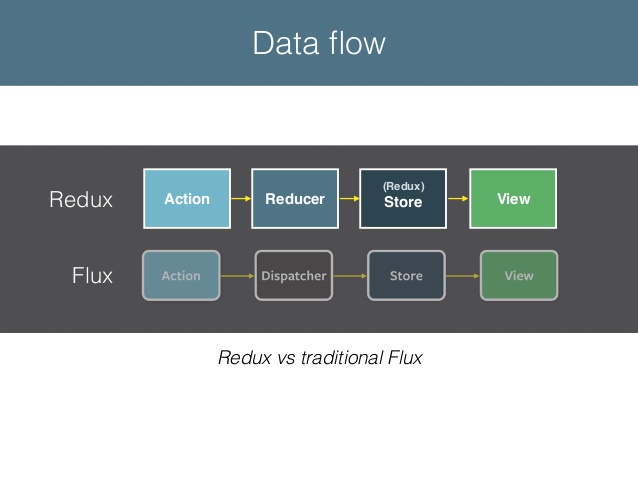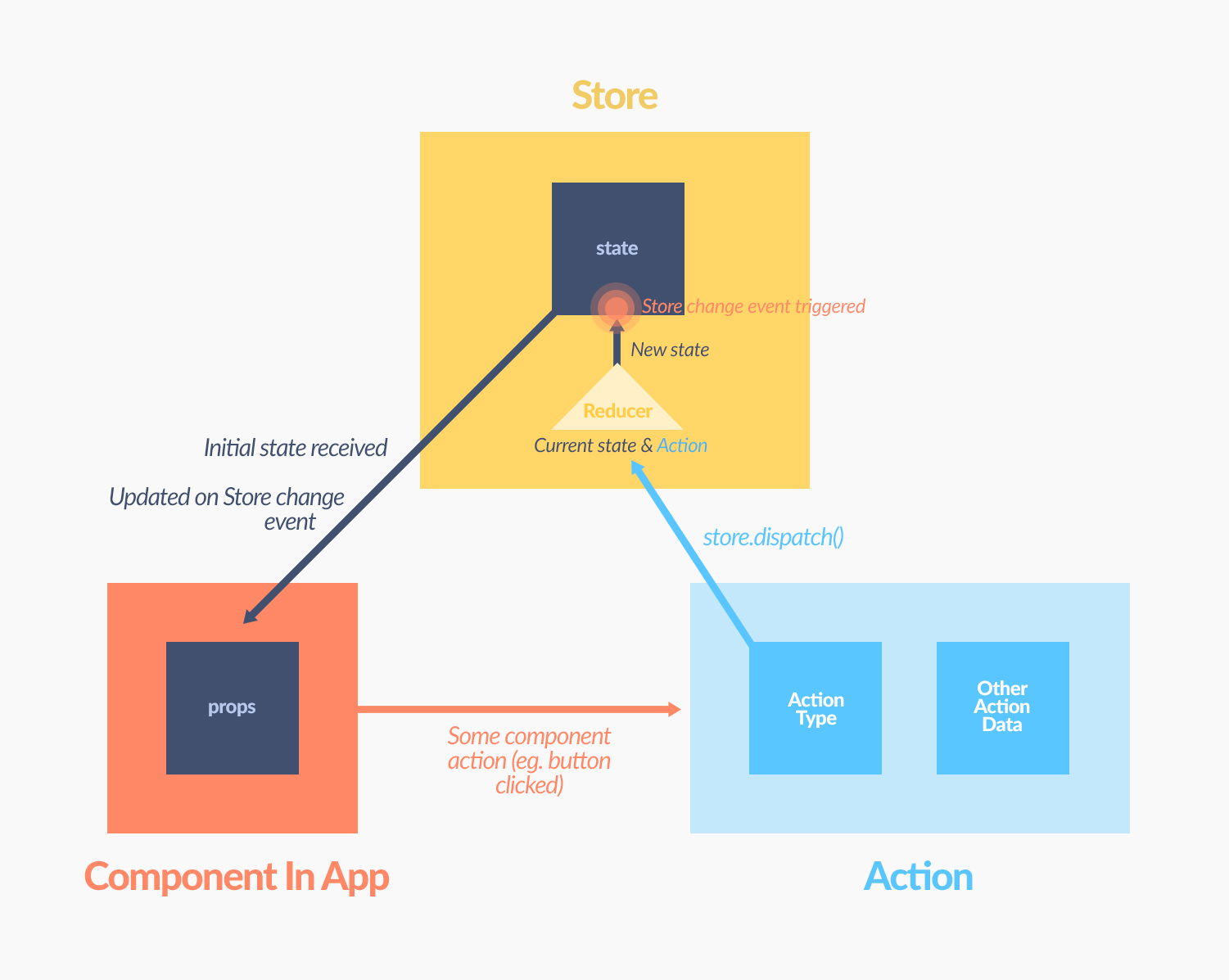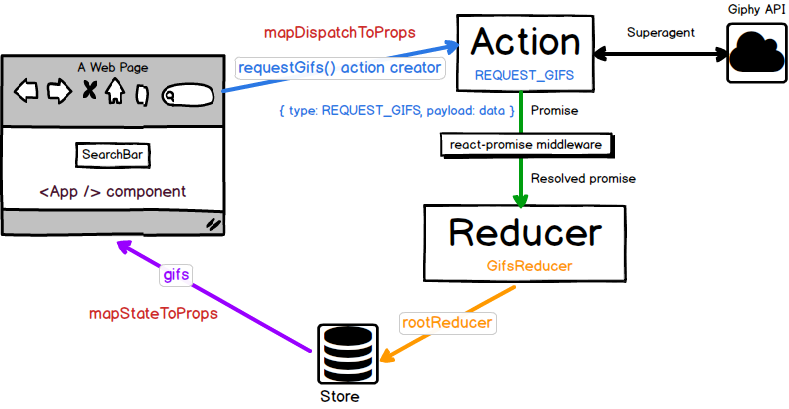Redux 基础概念

前言
前面一个章节我们讲解了 Flux 的功能和用法,但在实务上许多开发者较偏好的是同为 Flux-like 但较为简洁且文件丰富清楚的 Redux 当作状态数据管理的架构。Redux 是由 Dan Abramov 所发起的一个开源的 library,其主要功能如官方首页写著:Redux is a predictable state container for JavaScript apps.,亦即 Redux 希望能提供一个可以预测的 state 管理容器,让开发者可以可以更容易开发复杂的 JavaScript 应用程序(注意 Redux 和 React 并无相依性,只是和 React 可以有很好的整合)。
Flux/Redux 超级比一比
从简单 Flux/Redux 比较图可以看出两者之间有些差异:

在开始实际操作 Redux App 之前我们先来了解一下 Redux 和 Flux 的一些差异:
只使用一个 store 将整个应用程序的状态 (state) 用对象树 (object tree) 的方式储存起来:
原生的 Flux 会有许多分散的 store 储存各个不同的状态,但在 redux 中,只会有唯一一个 store 将所有的数据用对象的方式包起来。
//原生 Flux 的 store const userStore = { name: '' } const todoStore = { text: '' } // Redux 的单一 store const state = { userState: { name: '' }, todoState: { text: '' } }唯一可以改变 state 的方法就是发送 action,这部份和 Flux 类似,但 Redux 并没有像 Flux 设计有 Dispatcher。Redux 的 action 和 Flux 的 action 都是一个包含
type和payload的对象。Redux 拥有 Flux 所没有的 Reducer。Reducer 根据 action 的 type 去执行对应的 state 做变化的函数叫做 Reducer。你可以使用 switch 或是使用函数 mapping 的方式去对应处理的方式。
Redux 拥有许多方便好用的辅助测试工具(例如:redux-devtools、react-transform-boilerplate),方便测试和使用
Hot Module Reload。
Redux 核心概念介绍

从上述的图中我们可以看到 Redux 数据流的模型大致上可以简化成: View -> Action -> (Middleware) -> Reducer。当使用者和 View 互动时会触发事件发出 Action,若有使用 Middleware 的话会在进入 Reducer 进行一些处理,当 Action 进到 Reducer 时,Reducer 会根据,action type 去 mapping 对应处理的动作,然后回传回新的 state。View 则因为侦测到 state 更新而重绘页面。在这个章节我们讨论的是 synchronous(同步)的情形,asynchronous(非同步)的状况会在接下来的章节进行讨论。以下就用官方网站上的简单范例来让大家感受一下 Redux 的整个使用流程:
import { createStore } from 'redux';
/**
下面是一个简单的 reducers ,主要功能是针对传进来的 action type 判断并回传新的 state
reducer 规格:(state, action) => newState
一般而言 state 可以是 primitive、array 或 object 甚至是 ImmutableJS Data。但要留意的是不能修改到原来的 state ,
回传的是新的 state。由于使用在 Redux 中使用 ImmutableJS 有许多好处,所以我们的范例 App 也会使用 ImmutableJS
*/
function counter(state = 0, action) {
switch (action.type) {
case 'INCREMENT':
return state + 1;
case 'DECREMENT':
return state - 1;
default:
return state;
}
}
// 创建 Redux store 去存放 App 的所有 state
// store 的可用 API { subscribe, dispatch, getState }
let store = createStore(counter);
// 可以使用 subscribe() 来订阅 state 是否更新。但实务通常会使用 react-redux 来串连 React 和 Redux
store.subscribe(() =>
console.log(store.getState());
);
// 若想改变 state ,一律发 action
store.dispatch({ type: 'INCREMENT' });
// 1
store.dispatch({ type: 'INCREMENT' });
// 2
store.dispatch({ type: 'DECREMENT' });
// 1
Redux API 入门
createStore:
createStore(reducer, [preloadedState], [enhancer])我们知道在 Redux 中只会有一个 store。在产生 store 时我们会使用
createStore这个 API 来创建 store。第一个参数放入我们的reducer或是有多个reducerscombine(使用combineReducers)在一起的rootRuducers。第二个参数我们会放入希望预先载入的state例如:user session 等。第三个参数通常会放入我们想要使用用来增强 Redux 功能的middlewares,若有多个middlewares的话,通常会使用applyMiddleware来整合。Store
属于 Store 的四个方法:
- getState()
- dispatch(action)
- subscribe(listener)
replaceReducer(nextReducer)
关于 Store 重点是要知道 Redux 只有一个 Sotre 负责存放整个 App 的 State,而唯一能改变 State 的方法只有发送 action。
combineReducers:
combineReducers(reducers)combineReducers 可以将多个 reducers 进行整合并回传一个 Function,让我们可以将 reducer 适度分割
applyMiddleware:
applyMiddleware(...middlewares)官方针对 Middleware 进行说明
It provides a third-party extension point between dispatching an action, and the moment it reaches the reducer.
若有 NodeJS 的经验的读者,对于 middleware 概念应该不陌生,让开发者可以在 req 和 res 之间进行一些操作。在 Redux 中 Middleware 则是扮演 action 到达 reducer 前的第三方扩充。而 applyMiddleware 可以将多个
middlewares整合并回传一个 Function,便于使用。若是你要使用 asynchronous(非同步)的行为的话需要使用其中一种 middleware: redux-thunk、redux-promise 或 redux-promise-middleware ,这样可以让你在 actions 中 dispatch Promises 而非 function。asynchronous(非同步)运作方式就如同下图所示:

bindActionCreators:
bindActionCreators(actionCreators, dispatch)bindActionCreators 可以将
actionCreators和dispatch绑定,并回传一个 Function 或 Object,让程序更简洁。但若是使用 react-redux 可以用connect让 dispatch 行为更容易管理compose:
compose(...functions)compose 可以将 function 由右到左合并并回传一个 Function,如官网范例所示:
import { createStore, combineReducers, applyMiddleware, compose } from 'redux' import thunk from 'redux-thunk' import DevTools from './containers/DevTools' import reducer from '../reducers/index' const store = createStore( reducer, compose( applyMiddleware(thunk), DevTools.instrument() ) )
总结
以上介绍了 Redux 的基础概念,若是读者觉得还是有点抽象的话也没关系,在下一个章节我们将实际带大家开发一个整合 React、Redux 和 ImmutableJS 的 TodoApp。
延伸阅读
- Redux 官方网站
- Redux架构实践——Single Source of Truth
- Presentational and Container Components
- 使用Redux管理你的React应用
- Using redux
(image via githubusercontent、makeitopen、css-tricks、tighten、tryolabs、facebook、JonasOhlsson)
:door: 任意门
| 回首页 | 上一章:Flux 基础概念与实战入门 | 下一章:Redux 实战入门 |
| 纠错、提问或许愿 |